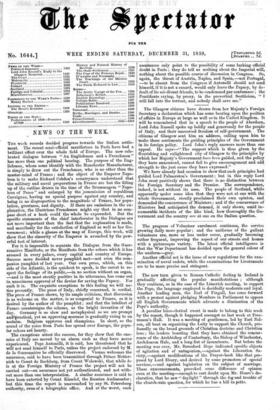NEWS OF THE WEEK.
THE week records decided progress towards the Italian settle- ment. The recent semi-official manifestoes in Paris have had a brilliant effect over the whole_ field of Europe. The now cele- brated dialogue between "An Englishman and a Frenchman" has more than one political bearing. The purpose of the Eng- lishman, whom some identify with the Manchester Manufacturer, is simply to draw out the Frenchman, who is no other than the master-mind of France ; and the object of the Emperor Napo- leon is to make Richard Cobden's countrymen understand that the military and naval preparations in France are but the filling up of the outline drawn in the time of the Brummagem "Napo- leon of Peace" and enlarged by the :commission of republican Cavaignae, having no special purpose against any country, and being in no disproportion to the magnitude of France, her popu- lation, greatness, and dignity. If there are omissions in the ex- planation, the illustrious Frenchman might say that in no com- pass short of a book could the whole be expounded. But the specific statements of the chief interlocutor in the Dialogue are not more important than the fact that the explanation is made, and manifestly for the satisfaction of England as well as her Go- vernment; while a glance at the map of Europe, this week, will show that the sincerity of the Emperor is avouched by the pow- erful test of interest.
For it is impossible to separate the Dialogue from the Guer- rouniere Manifesto, or the Manifesto from the echoes which it has aroused in every palace, every capital and country of Europe. Success more decided never pamphlet met—not even the com- panion pamphlet of last year. Our own press, which, on this side of the Atlantic, is the quickest to speak, is the surest to re- spect the feelings of its public,—in no section without an organ, —and is the most stoutly positive in its utterances, has come out innnanimons approval of the device for saving the Papacy. For such it is. The exquisite exceptions to this feeling we will no- tice presently. The press of Italy, chiefly concerned, is cordial. The press of France shows, by its ample criticism, that discussion is as welcome on the matter, is as congenial to France as it is desired by the author of the pamphlet ; and that the intellect of France countersigns the scheme, as the bright invention of the day. Germany is as slow and metaphysical as we are prompt anclifractical, yet an approving murmur is gradually rising to an acclaim. Belgium approves and champions. In short, as the sound of the T01.08 from Paris has spread over Europe, the popu- lar echoes are hearty.
The exceptions attest the success, for they show that the ene- mies of Italy are moved by an alarm such as they have never experienced. Pope Antonelli, it is said, has threatened that he will not send himself to Paris, unless the project endorsed by M. de la Gueronniere be officially disavowed. Vienna welcomes the assurance, said to have been transmitted through Prince Metter- nich to Count de Rechberg, from Count Walewski, that while he is at the Foreign Ministry of France the project will not be carried out—an assurance not yet authenticated, and not with- out more than one interpretation. A similar assurance is said to have been extorted by Count Kis' selef, the Russian Ambassador; but this time the report is unavouched by any St. Petersburg authority, even of a telegraphic office. And at the worst, such assurances only point to the possibility of some lurking official doubt in Paris ; they do tell us nothing about the Imperial will, nothing about the possible course of discussion in Congress. So, again, the threat of Austria, Naples, and Spain,—not Portugal, —to be absent from the Congress if Antonelli should not send himself, if it is not a canard, would only leave the Papacy, by de- fault of its soi-disant friends, to be condemned par oontumaoe ; the Pontificate crying, by proxy, in the proverbial Soottioism, "I will fall into the torrent, and nobody shall save me."
The Glasgow citizens have drawn from her Majesty's Foreign Secretary a declaration which has some bearing upon the position of affairs in Europe at large as well as in the United Kingdom. It will be remembered that in a speech to the people of Aberdeen, Lord John Russell spoke up boldly and generously for the people of Italy, and their uneoerced freedom of self-government. The citizens of Glasgow sent him an address, calling upon him to make those sentiments the guiding principles of the Government in its foreign policy. Lord John's reply answers more than one appeal. He says—" The support which is thus given by the flourishing and enlightened city of Glasgow to the principles by which her Majesty's Government have been guided, and the policy they have announced, cannot fail to give encouragement and add strength to the just cause they have expressed."
.. We have already had occasion to show that such principles had guided Lord Palmerston's Government ; but in this reply Lord John most positively shows that there is no distinction between the Foreign Secretary and the Premier. The correspondence, indeed, is not without its uses. The people of Scotland, while apparently wider some idea that they were not at one with the whole Government, stoutly proclaimed their own opinion, and demanded the concurrence of Ministers; and if the concurrence of Ministers had actioipated the demand, it only shows, amid in- numerable incidents of the like kind, how thoroughly the Go- vernment and the country are at one on the Italian question.


























